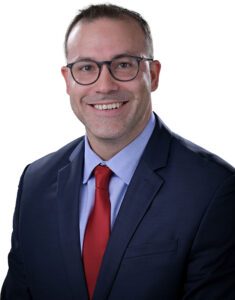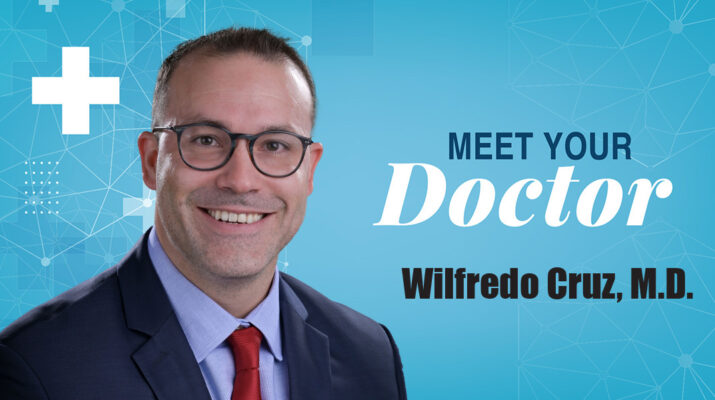Farmington internal medicine doctor talks about his focus on cardiometabolic health, which is a growing branch of medicine focused on cardiovascular-kidney and metabolic disease (CKM)
By Chris Motola
 Q: How long have you been with Thompson?
Q: How long have you been with Thompson?
A: September was my second-year anniversary. So not long, actually.
Q: What’s it been like so far? What brought you to the area?
A: So, believe it or not, I’m natively from San Juan, Puerto Rico, but my wife is from Toronto. We had our first daughter back in 2019. We were both mostly hospital brats back then. And then because of the pandemic, we really couldn’t have any other way of generating income that wouldn’t put our daughters at risk. So we decided to step away from hospital medicine. And then because of the distance to Toronto, Upstate New York was the only viable alternative. So we kind of fell in love with the area and we actually went to Geneva for the first three years and then we relocated to Thompson. I live now six minutes away from where I practice, so I brag about it, because I have a six-minute drive to go to work.
Q: I understand you and your wife aren’t just both physicians, but you’re actually in practice together.
A: Yes, sir, we are. We barely see each other, because we’re both so busy. But, yeah, we run an internal medicine practice over at state Route 332 in Farmington.
Q: What’s it like working with your spouse?
A: So, for us, it’s actually very useful, and I would dare to say that for both our patients and even the medical providers that now have joined us recently. We graduated from the same program, we went to the same program, heck, we even have the same amount of awards, right? We both graduated top of our class, so it creates a very homogenous way of practicing medicine, which is very useful for the staff and even the nurse practitioners that work there. Even if you see one of my patients or you see one of my wife’s patients, just by looking at how we practice medicine, you have a very good understanding of what we’re trying to do with those patients. And it’s a very good place for us to actually teach, which is why I’m also part of the School of Medicine and part of the preceptorship. One of things that we pride ourselves in is that we have a very good circle of colleagues that are very like-minded. And because of this we try to streamline that process by making sure that we actively communicate with each other constantly and can refer patients to each other as needed.
Q: Do you have a particular area of interest within your specialty?
A: So we mostly do both general and internal medicine. I do love diabetes and obesity and we’re actively running a weight loss and a cardiometabolic clinic from our office. We’re actually very excited to see if we could maybe take that momentum and convert our office into one of the few sites in the nation that handles CKM syndrome, which is a technically a new type of syndrome that was recently defined. We’ve known about it for a while but now it has started to get recognized. CKM, by the way, stands for cardiovascular kidney and metabolic syndrome. These are often diseases that get managed individually but now the American Heart Association and several other institutions are pioneering a more global perspective, not seeing these diseases as three separate entities, but more of a complex problem in which each part feeds the others.
Q: So that’s interesting and is kind of the opposite of what seems to be happening in oncology, where cancer seems to be increasingly viewed as a cluster of different diseases with some similar qualities.
A: Correct. But to your point, let’s take that cancer example. As we keep learning about cancers we find there’s metabolic problems like obesity, extra hormones that feed the cancer. So one of the things that we’re now seeing is that obesity is associated with, like, 13 different types of cancers. So if we just tackle the cancer as an individual problem we might be missing other factors that could lead down the road to further complications. It is one of those reasons why female patients that develop breast cancer go on anti-estrogen therapy to make sure we don’t feed the cancer if it ever does come back. So it’s kind of the same approach where we’re now seeing these problems not as individual diseases but as a global encompassing problem. It’s kind of like an octopus that has multiple tentacles and these tentacles are kind of affecting other areas. Diabetes is one of those big ones of course.
Q: What relationship does CKM have with obesity?
A: So this is very important because we’ve known how that obesity is a risk factor for cardiovascular disease since back in 1942. But we’ve kind of always treated it, I’ve been guilty of this myself when I was in my early years where we monitor blood pressure, cholesterol and if your diabetes is well controlled, well, good see you in a couple months. But then we kind of let the obesity do its own thing. We might refer them to like a nutritionist and if the patient really doesn’t do well in the obesity aspect, well, we cut our losses. But now, to answer your question, we have much better understanding that those fat cells are not just creating weight, they’re creating pro-inflammatory cytokines that are causing endothelial dysfunction which can lead to harder to treat blood pressure. The fat starts to get stored also in our major organs, which could lead to oxidation of those organs and then you know just simply malfunctioning of some of those organs. You can get fatty liver disorder and then that inflames the liver and eventually could become the precursor of end-stage liver disease.
Q: I assume this also applies to metabolic conditions like diabetes?
A: It does. We have also organs that get just simply burned out like pancreas, right? Now you have insulin resistance because of that same fatty tissue. It just can’t keep up with the insulin resistance and then the beta cells in the pancreas eventually start dying off, which leads to Type 2 diabetes. So, if you notice, we started the conversation with obesity and we very quickly started touching on other major problems that often require medications or several types of medications. But if we were to address the original problem, all of these other subsets of diseases will see benefit as well. And instead of maybe putting the patient on four different meds, we might only need one, right?
Q: Are GLP-1s that medication?
A: I work very closely with a lot of these companies and one of the benefits that we’re seeing from some of these drugs is their pleiotropic effects. Pleiotropic meaning that they work on multiple sites on the body. It’s like these drugs were almost designed to tackle some of these problems. The GLP-1s are making our patients lose weight, but how exactly are they doing so? Well, they modulate appetite and shut down a lot of the food noise our patients experience. But they’re also very good drugs at breaking down fat. So if we go back to obesity, the weight itself is part of the problem, but more concerning yet it’s what the fat cells are doing to the body. So it makes perfect sense that you start some of these patients on these weight loss agents and all of a sudden the liver disease gets better which, by the way one of these GLP-1 just got approval on Aug. 15 for treatment for fatty liver disorder or MASH (Metabolic Associated Steatohepatitis) as it’s now being called. So this is so much more than just a weight loss conversation! These drugs started as diabetic drugs, now they’re weight loss drugs, with cardiac, renal and even liver benefits. But we don’t want to miss the forest for the trees and only talk about those indications.
How does this compare to losing weight by other more traditional methods? Well I know it’s obviously harder to lose weight the old-fashioned way. There are many factors that may be out of the patient’s control that could be contributing to their inability to lose weight. But are there pros and cons to either approach? Absolutely, yes! We would never want to start a patient on a drug, if we can avoid it. But we also have to keep in mind that our patients go through a lot of ups and downs and there may be times where we need a more hands-on approach.
Lifelines
Name: Wilfredo Cruz, M.D.
Position: Internal medicine physician at Thompson Health Canandaigua Medical Group, based in Farmington
Hometown: San Juan, Puerto Rico
Education: Universidad Iberoamericana, Santo Domingo, Dominican Republic
Work Experience: Internal medicine, Thompson Health Canandaigua Medical Group, Canandaigua (September 2023-present), internal medicine, FLH Medical PC & Clifton Springs, Geneva (2020-2023)
Affiliations: University of Rochester Medical System, Thompson Health
Organizations: American Board of Internal Medicine; Alpha Omega Alpha Medical Honor Society; American College of Physicians
Family: Wife, two daughters
Hobbies: Golfing, food tasting, technology, tabletop gaming

